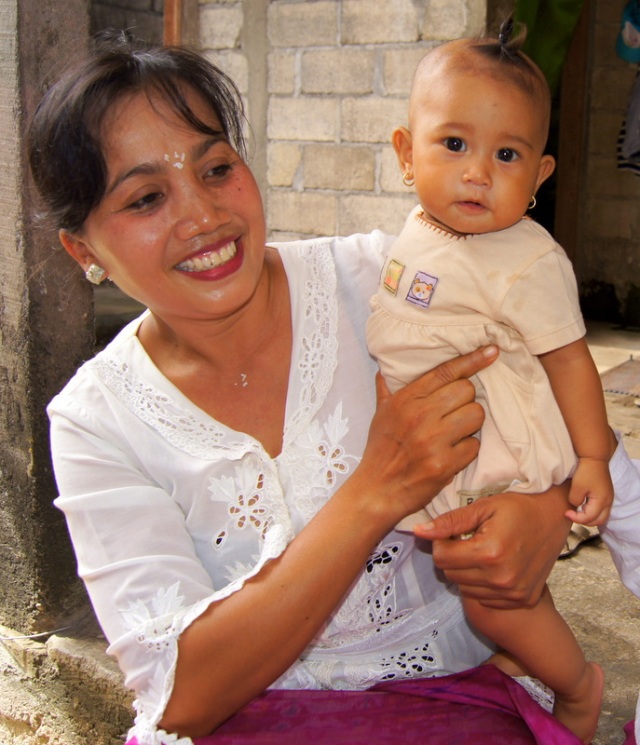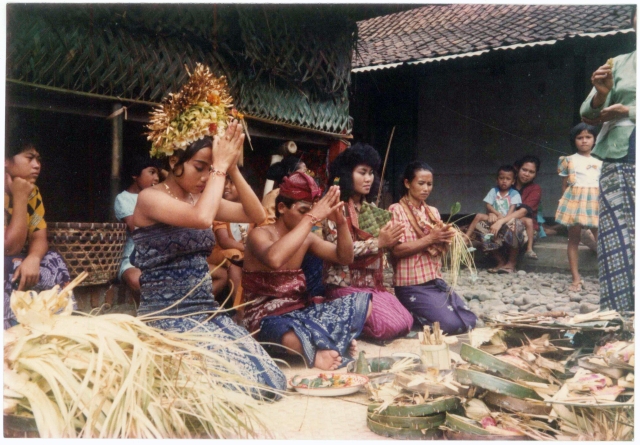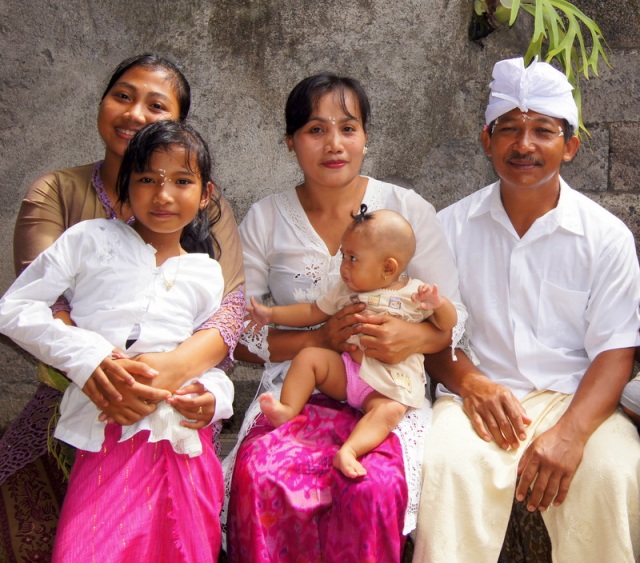Dear Jan:
In this letter, I want to tell you the story of Ibu Made, my beloved pembantu, a role that translates as “helper.” Made is far more than that — she is the major domo of this house. Sometimes I feel that it belongs to her more than me, as she was here before I came and will stay after I leave. She knows every nook and cranny, understands exactly what needs to be done, deals with merchants, pays bills, keeps accounts, etc. Not only that, she keeps the house spotless, our clothes clean and folded, and she makes sure that we are well-fed. All in all, she is the model cook/housekeeper. Far more than this, she is an amazingly strong and resilient person who I am lucky to have as a helpmeet and friend.
Made was born in Bali’s capital city, Denpasar, on Christmas Day, 1965. She was born into the lowest caste of Balinese society, a fact that, for her, has had important ramifications. The Balinese caste system is similar to that of India, except that there is no “untouchable” class. At the top of the system are the Brahmans, traditionally made up of priests and holy men, next is the Satria or warrior class, third, the Wesya or merchant class, and finally the Sudras, the peasants who make up more than 90% of the population.
Since the Dutch colonial years and more recently after Indonesian independence, the differences in the economic roles of the members of the caste system are slowly eroding, as the government prohibits treatment based on caste status. But socially and spiritually, the caste system remains influential. During religious ceremonies or village councils respect and special consideration are still expressed to the higher caste members (perhaps with an ironic smile on some Sudra faces). The Balinese language is divided in different levels of politeness: low Balinese, medium Balinese, high Balinese and sacred Balinese. A Sudra will usually address himself to a Satria, Brahman or Wesya in high Balinese, while the higher-caste member will answer in low Balinese to affirm his superiority.
For Made, her Sudra status became an issue when she chose to marry a man of a higher caste, but that is getting ahead of the story. Made is the eldest child in her family, with 3 younger siblings. Her father was a farmer who biked 10 kilometers a day to work in his fields at the edge of the city. Her mother sold produce in the local market, and Made helped out at home while attending school. All seemed well until Made was 10 years old and her mother suddenly disappeared. At first she didn’t know what had happened, but gradually she learned the truth: her mother had run away with another man, something hugely shameful and almost unheard of in Balinese society.
The abandonment of the family by her mother left 10-year-old Made squarely in charge of the household. As the eldest child, she was responsible for cooking, cleaning, laundry and child-care. She did have some help from her paternal grandmother, but she did the lion’s share of the work. And somehow, she managed to attend school through all of this. It is mind-numbing to think of the pressure and responsibility she had to bear during those years. She remembers with regret the “there was not time to play, to have fun, to be a child.”
As Made neared age 18 and realized she would be marrying and leaving home before long, she began to worry about what would become of her siblings, who still needed looking after. Made had learned that her mother had only stayed with her paramour for one year and had since been living with her older brother in Sanur. Made’s mother, had, in fact, made several attempts to reach out to Made over the years through family friends, but Made had always angrily rebuffed these efforts.
Despite her deep resentment, Made decided it was time to forgive and move on, so that her siblings might have their mother back. She went to her uncle’s home in Sanur to meet with her mother and to convince her to return home. Her mother resisted at first, feeling too ashamed, but eventually relented. Meanwhile, Made had been working on her father, urging him to take his wife back for the sake of his children. The reunion, fully engineered by Made, was extremely emotional for everyone involved. With time, the family adjusted to the disgraced mother’s return and the neighborhood also gradually accepted it.
Meanwhile, Made began working at a villa complex in Sanur and soon met Agus, a handsome young security guard from the Brahman class. They fell in love and decided to marry. The problem was their vast difference in caste status. Made’s family did not want the marriage because it would forever create a class difference between themselves and Made — upon marriage, Made would be elevated in caste and would no longer be able to directly participate in her parents’ cremation ceremonies. For Balinese parents, this constitutes an important loss. Meanwhile, Agus’ family was not keen on their high-caste son marrying a Sudra.
Made and Agus prevailed and were eventually married in a traditional ceremony in Agus’ home village:
With the marriage, Made had to give up her birth name, which was Wayan, meaning first-born. Because she was marrying into a higher caste, she could no longer have a name associated with being “first.” Thus, she was given the name Made (meaning second-born) as a sign of respect to her husband. This demotion was a sad harbinger of things to come. While the marriage started out happily enough, things quickly deteriorated. Agus began gambling and drinking and by the time their first daughter, Dede, was born a year later, he was working only intermittently. The family was getting by on Made’s small salary from a waitressing job. Worst of all, Agus had begun to beat Made when he came home drunk.
Made put up with this abusive situation because she felt she had no recourse. It is very difficult to divorce a man of higher caste, and even in cases where caste is not an issue, divorce presents impossible dilemmas for Balinese women. Women who leave their husbands lose their children, who stay with the father’s family, and oftentimes they are not accepted back into their family of origin. They are left in a no-man’s land that is untenable in Bali’s highly communal society. Feeling she had no alternative, Made continued to support the family, to raise Dede and to fend off Agus’ drunken rages.
As time went on, Agus developed a serious condition of hypertension, which caused him to gradually cut back on his drinking and gambling. Things improved enough that Made was willing to have another child with him and Alit, their second daughter, was born in 2002. Here is Alit, now 9, at the local temple with her mother:
While Made adores her two daughters, she worries that she has no sons. In Balinese society, it is the sons who care for the aging parents and take over responsibility for the family compound. She is concerned about Agus’ health and about how they will manage as they grow older. She pins her hopes on her girls and their husbands taking on some of what would be a son’s responsibility.
Dede, in fact, is already married and has two small daughters of her own. Here she is with her younger child:
Dede’s life illustrates some of the pitfalls inherent in the Balinese custom that requires brides to move in with their in-laws. Relations were initially good between Dede and her mother-in-law, and indeed the mother-in-law offered to pay the tuition for Dede’s teacher training. However, as time has gone by relations have become strained and now the mother-in-law has stopped making school payments. Dede is trying to get a loan to finish school, but this is difficult and she is wondering whether she will ever earn her degree.
At the same time, the soured relations with her in-laws makes her daily life complicated — they all live in the same compound and have to interact, but the atmosphere is tense. According to Made, this kind of situation is common and many young couples have to deal with such problems. Their freedom of choice is limited both culturally and financially, so they must stay in the family compound and endure the vagaries of family relations.
Made is philosophical about it all. She is a deeply religious woman who puts her faith in God and accepts what life brings. She does acknowledge that her own life has been unusually arduous, and puts this down to Karma — she shakes her head, wondering what acts in past lives have caused her current difficulties. What she is most fiercely determined about is that her children should have a better life than hers.
She grows tearful when she remembers her own youthful aspirations: she very much wanted to become a policewoman, but her family did not have the money to pay for her training. She says she will do whatever it takes to get Dede through school now that the parents-in-law have withdrawn their support. And she is very clear that Alit will not become a housekeeper like herself — she likes to think of Alit in college, perhaps training to become a nurse. These dreams for her daughters appear to keep her going and to distract her from her daily worries.
As a final image, I leave you with this picture of Made at the center of her family, the pillar that supports the whole structure, calm, accepting and incredibly strong:
That is all for now, Jan. Hugs to you and all the family, Katherine





